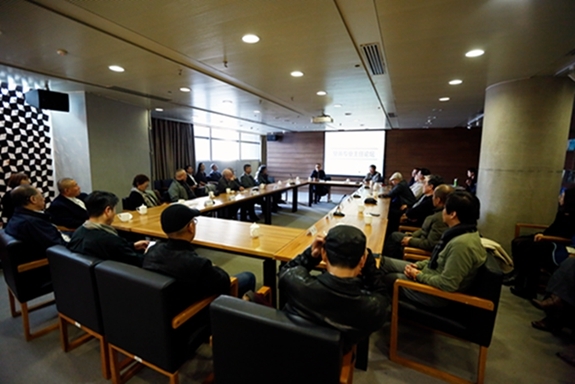
2017年3月10日,“图墙——中央美术学院壁画系教师作品展”于中央美术学院三层展厅启幕。展览由中央美术学院主办,中央美术学院壁画系、中央美术学院美术馆承办,中央美术学院院长范迪安担任学术主持。展览由自壁画系成立以来几代师生参与国家公共文化创作的文献展与18位现任教师带领学生手绘完成的“图墙”组成。
研讨会现场
为进一步推动高校壁画专业人才队伍的建设,从学术层面构建和深化壁画教育机制,围绕此次展览,“当代中国壁画的高等教育与研究”首届全国高校壁画专业主任论坛在中央美术学院美术馆多功能报告厅召开。该学术论坛由中央美术学院壁画系主任唐晖召集,副主任孙韬主持,唐小禾、孙景波、唐晖、孙韬、白晓刚、李辰、梁怡、叶庆、李筱谦、张静、唐鸣岳、杨清泉、郗海飞、崔彦伟、齐喆、黄山、王雄飞、谷云瑞、李天元、王贻华等嘉宾出席。该论坛主要就近年来壁画专业产生的变化以及就高校壁画专业的教育的过去、当下与未来的发展等方面做出探讨。
会议伊始,孙韬教授首先代表中央美术学院壁画系向来自全国各个院校及单位的壁画专业的主任以及从事壁画方面的艺术家表示欢迎。并随即介绍了此次论坛借展览开幕之际,以研讨会的形式呈现,将全国壁画专业领域的学者、从业者汇聚一堂,做一次内部的深入交流。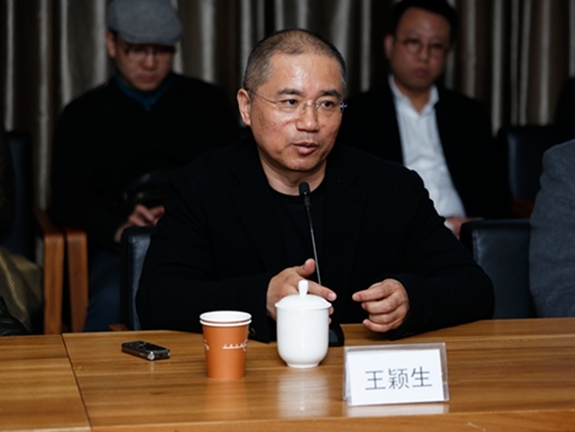
中央美术学院造型学院党总支书记、修复学院院长王颖生教授
首位发言的是王颖生,他提及了本次展览的形式别开生面,另外分享了参与绘制墙面壁画作品的一些感受,最后提到了今年9月中央美术学院修复学院成立,届时国内外专家云集,将会是一次针对壁画艺术的新观念、新材料的深入交流与学习的机会。他亲自参与到此次展览过程中,并感叹:“此次展览把壁画创作慢慢地变成装置和行为的过程,对于壁画创作具有特别新颖的创意。”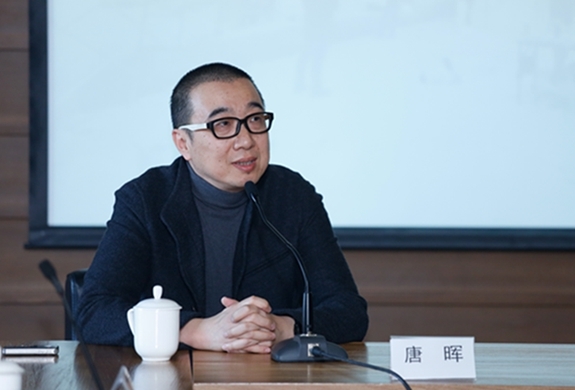
中央美术学院壁画系主任唐晖教授
接着,唐晖做发言,他首先依次介绍了中央美术学院壁画系目前招生、教学资源、教学思路以及四个创作工作室等情况。其次,他提及了本次展览表现形式有所创新的初衷,因承接的国际街画展与大水峪村的社会影响不断扩散,产生了在美术馆里直接“图墙”的这样一个展览方式,可以直观地体现壁画系的专业特点。通过系主任论坛把大家召集在一起,希望通过此次论坛,使得能够达成一个“握拳”的协议,一起为未来的壁画事业做出一点事情。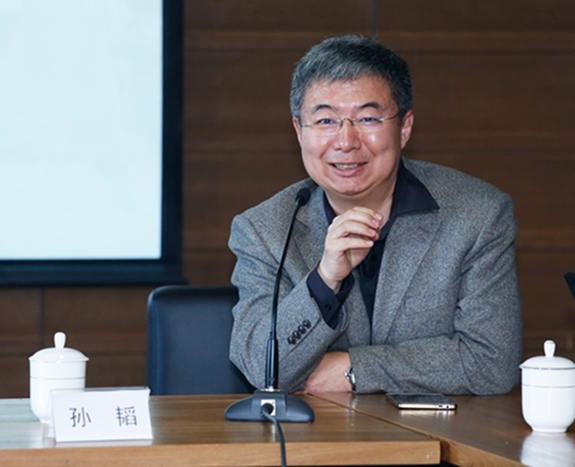
中央美术学院壁画系副系主任孙韬教授
孙韬老师就上世纪各个学院的壁画系面临的起伏提出了个人艺术成就如何与壁画相结合的问题。
中国美术学院绘画学院壁画系主任梁怡
第四位发言人是中国美术学院绘画学院壁画系主任梁怡。他首先介绍了中国美术学院壁画系的成立与发展方向,以及大致的教学情况。结合此次展览的新气象,他希望全国的壁画队伍能够联合起来“发声”,将顶天立地的壁画艺术发展起来。他说道:“壁画系也会做一些自身的定位,因为跟以前的工作室的教学模式相比也会发生变化,现在以学院的教学模式来说,中国美院的院长许江提出“三环互动”的概念,即工作室、研究所和实验室这三环做一个教学上的互动,把教学、创作和社会实践结合起来。”
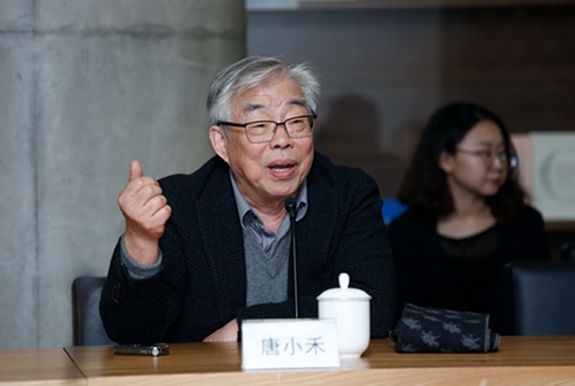
中国美术家协会壁画艺委会主任唐小禾先生
中国美术家协会壁画艺委会主任唐小禾就壁画教学中的重点问题提出他的看法,他认为解决壁画创作的材料问题并非教学的重点,学生的艺术理念、创作思想以及造型能力才是教学中的重中之重。一切应当回归到学生。唐先生还特别提到了湖南省常德市的桥体壁画的形式。他建议将本次论坛常态化,以类似年会的形式绵延下去。最后他提出当下国内对于“公共艺术”这个概念没有一个明确的界定,希望对此展开深入地讨论。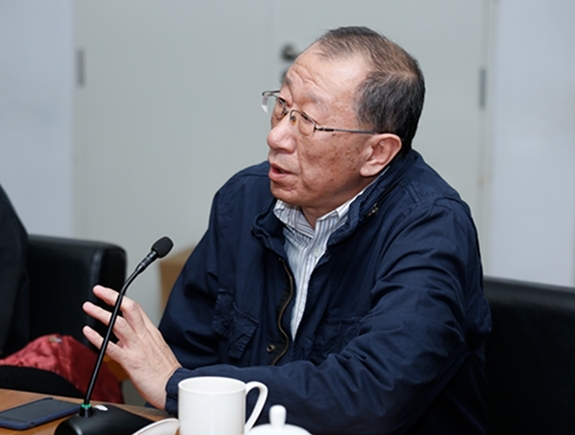
清华大学美术学院的郗海飞老师
清华大学美术学院的郗海飞老师肯定了以现场墙绘为主的展览这一形式,并认为这一形式首先体现了自由的气息。他进一步谈到此次展览打破了社会对壁画创作较为局限的认识,此次展览,不管是画中国画、做版画、做油画、做雕塑只要跟墙面和公共环境有所关联,就是自由绘画的气息在召唤大家;第二体现了合作的气息,以本次展览为契机将全国壁画人齐聚一堂进行交流。接着,他同样介绍了清华大学美术学院目前的教学情况。由展览体现出来的自由气息对未来壁画事业的发展提出了新思考与新方向。
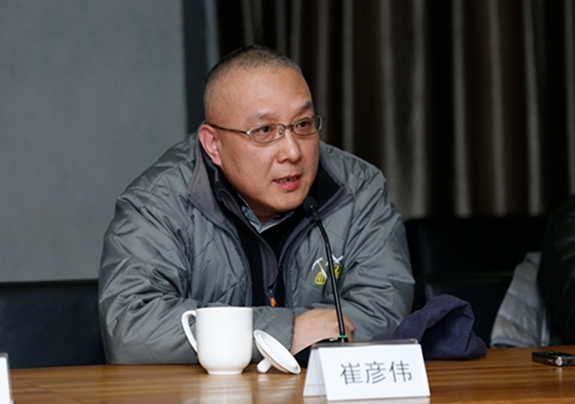
清华大学美术学院壁画与公共艺术教研室主任崔彦伟老师
清华大学美术学院壁画与公共艺术教研室主任崔彦伟老师补充介绍了清华大学美术学院的发展脉络以及在发展中产生的一些问题和解决方式,也提出了清华大学美术学院在招生人数方面面临的问题与困惑。他提出应当让壁画和公共艺术进行融合拓展。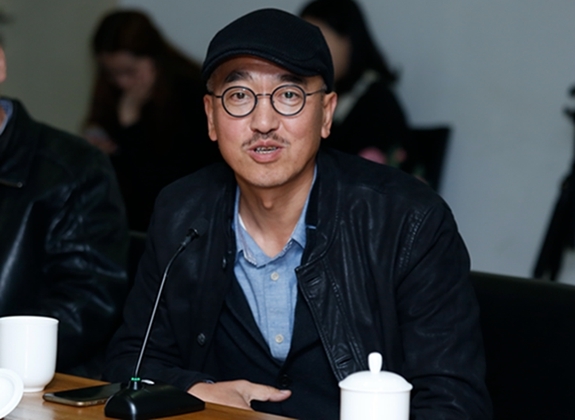
清华大学美术学院李天元教授
中央美术学院壁画系第二届毕业生、清华大学美术学院教授李天元。他提出本次展览是一次非常有人文色彩的、自由的、令人感动的一次展示。他提到:“每个艺术家都会面临两个问题,一个是你自己要画什么,再一个是你要考虑到社会或者是别人,公共艺术绘画可能很多都是要考虑到综合因素和具体的要求,这个展览特别成功在于它非常自由,空间自由、每一个人的表达和绘画的方式也非常地自由。”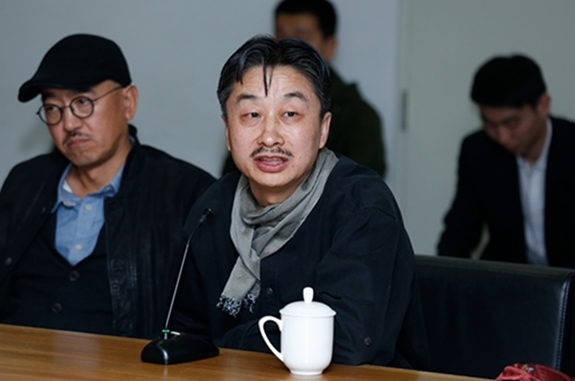
中国建筑学会环境艺术委员会主任委员谷云瑞
谷云瑞是中国建筑学会环境艺术委员会主任委员,同样也是中央美术学院壁画系第二届的毕业生。他结合自己的项目与作品,认为壁画创作不应过于重视材料,应重视绘画本身,重视造型与色彩的基础训练。壁画应与工艺美术有所区别,真正的壁画家应与做壁画“行活”的人拉开距离。他特别提出壁画人要团结起来,一起向社会发出自己的声音。
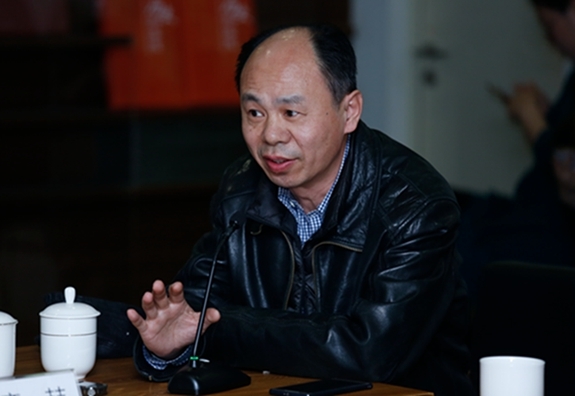
中央美术学院壁画系第一届毕业生王贻华老师
同样来自中央美术学院壁画系第一届毕业生的王贻华,他表示展览对他的触动非常大,此次展览着重空间的表达形式,有类似于在洞窟里观摩壁画的体验,别出心裁。更值得欣慰的是此次展览也是一次壁画系教师的自我展示、言传身教的教学过程。他认为壁画形式分为两种,一种是受到外部条件限制的功能性壁画,另一种是展示艺术家自身对于艺术理解的壁画。“图墙”展览有很多层意义在里面。他指出,壁画最终还是艺术问题,壁画在艺术上的成就和被理解,最终会是艺术家个人的问题。
南京艺术学院壁画系主任张静首先介绍了南京艺术学院壁画系历史情况与当下的教学情况,也表达了对于壁画在高校中作为一门学科被边缘化的担忧,社会需求的重要性。提出壁画专业的学生应认清本学科的优势在于材料表现语言的多样与组织大画幅画面的能力,发挥自身的长处。
山东艺术学院美术学院副院长唐鸣岳首先介绍了本学院的教学情况。他提到了此次展览类似涂鸦墙的呈现方式有别于传统壁画展览的认识,此次展览更具有主题性,就像一个艺术节。另外,他希冀壁画专业的主任论坛能够深入开展,联合起来,作为一个固定的机制为中国未来的壁画事业培养继承人。他建议借着这个展出的机会,另外起草一个战略协议,以协议的形式把这个东西做得更加深入一点,这样对教学和中国的壁画推动都有很大的作用。
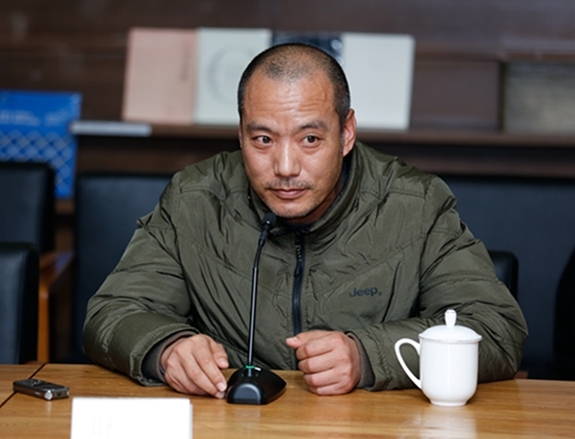
湖北美术学院壁画与综合材料绘画系主任叶庆老师
湖北美术学院壁画与综合材料绘画系主任叶庆大致介绍了本系的发展情况。他提到,当下学生在壁画创作中更加偏向于材料而不是造型,这可能与学生的造型能力下降有关。高校在培养壁画专业的学生时更倾向于使用不同的教学手段、不同的课程,贯穿培养审美、造型及创作能力。但由此也会带来学生培养深度不足的问题。他提出壁画有着与时俱进的特色,应时刻保持干劲。
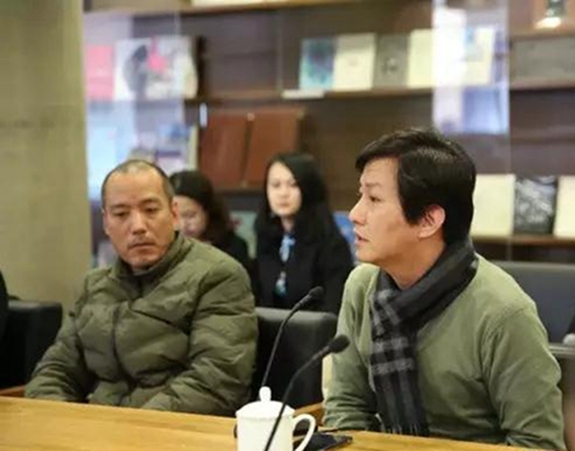
广州美术学院建筑艺术设计学院齐喆老师
广州美术学院建筑艺术设计学院齐喆老师首先介绍了本系的教学特色。对于本次展览,首先,他提出了艺术家个人创作语言与壁画创作语言之间的共通性。寻找壁画人在创作中的主动性,改善社会上对于壁画创作者的刻板印象。其次,从文献展中看出中央美术学院壁画系求新求变的态度,提出对于壁画的可流动性、可拆装性的想法。他认为中国传统壁画艺术追求的是千年不朽,当下壁画的永恒性可能会受到一些挑战,而壁画人也要应对这种大环境作出改变。
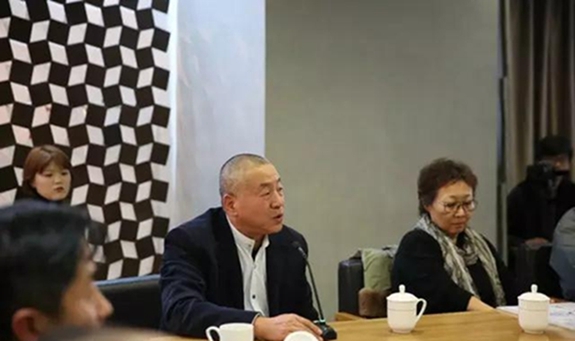
中国美术学院岩彩画研究所主任王雄飞
中国美术学院岩彩画研究所主任王雄飞老师提出了现阶段壁画教育面临的教师专业背景复杂、学生年轻化等问题。他同样强调了基本功训练的重要性,同时也补充了培养学生文化自信的重要性。他进一步解释,壁画专业相对于其他的艺术学科,在教学上有一定的难度,因为短暂的四年本科学习,学生的年大多在20来岁,他们对绘画的理解,包括壁画特有的造型的理解的学习,很难很快得到一个成果。再加之壁画系的老师来自于各个学科背景,包括每个老师的学科如何对壁画系学生的教学产生沟通,这都是需要在教学环节中严肃面对的问题。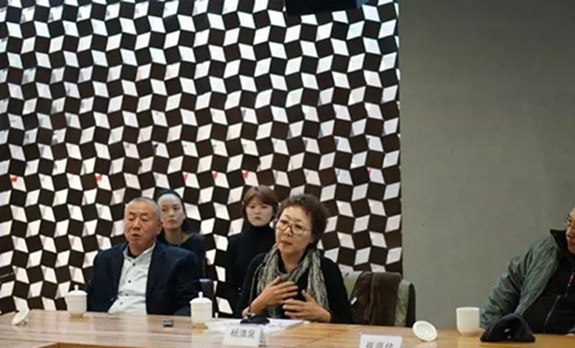
上海大学美术学院壁画专业博士生导师杨清泉
此外,上海大学美术学院壁画专业博士生导师杨清泉结合自身的实例提出壁画的生存价值问题,壁画专业应当让社会加深对其的了解。天津美术学院壁画系主任李筱谦老师提出本次展览体现出中央美术学院壁画系在艺术创作中亲切、轻松、自由的一面,有别于往常央美在创作大型壁画项目中的状态,呈现出央美壁画系在艺术探索的多元性。四川美术学院中国画系主任黄山老师认为中央美院提出来的涂墙,他看到那个墙中更大的是强大的强,他认为中央美院给壁画的发展提供了现代性思考的平台。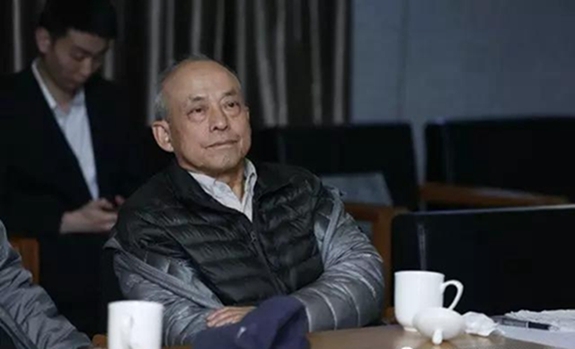
中央美术学院教授孙景波
最后,由中央美术学院教授孙景波对本次研讨会做出总结。他说道本次展览是壁画的创作与教学实践的一次“闪电战式”的实战演习,虽然得到了在场嘉宾的肯定,但还存在不尽完善之处。针对壁画专业学生与社会的关系,他提出当代壁画人应培养工匠意识,打造一支能为社会服务的团队,学院的壁画创作队伍要改变以往守株待兔式的方式,有服务社会的主动意识。同时,他还谈到在壁画创作中“限制”与“自由”的关系,壁画作品是可以与社会的需求相契合,他进一步指出,壁画创作中完全的个性化会丧失壁画的功能性。最后,他寄予厚望,希望在未来的壁画教育中不放弃学术坚持,要时刻做到承前启后,继往开来。
此次论坛结合展览顺利举办,彰显了中央美术学院壁画系全体师生的累累硕果,同时,该论坛与来自全国兄弟高校的嘉宾群策群力,针对壁画师资队伍建设、壁画艺术与社会的关系、当代壁画创作的传统及创新等方面作出了可贵的探讨与深度的交流,共谋我国高校壁画专业教育与研究的新蓝图。与会嘉宾纷纷表示希望该论坛能形成长期机制,将壁画艺术薪火相传。
文字整理/刘春琳,梁馨予
编辑/辛宇
CAFA Art Museum Publication Authorization Agreement
I fully agree to CAFA Art Museum (CAFAM) submitting to CAFA for publication the images, pictures, texts, writings, and event products (such as works created during participation in workshops) related to me from my participation in public events (including museum member events) organized by the CAFA Art Museum Public Education Department. CAFA can publish these materials by electronic, web, or other digital means, and I hereby agree to be included in the China Knowledge Resource Bank, the CAFA Database, the CAFA Art Museum Database, and related data, documentation, and filing institutions and platforms. Regarding their use in CAFA and dissemination on the internet, I agree to make use of these rights according to the stated Rules.
CAFA Art Museum Event Safety Disclaimer
Article I
This event was organized on the principles of fairness, impartiality, and voluntary participation and withdrawal. Participants undertake all risk and liability for themselves. All events have risks, and participants must be aware of the risks related to their chosen event.
Article II
Event participants must abide by the laws and regulations of the People’s Republic of China, as well as moral and ethical norms. All participants must demonstrate good character, respect for others, friendship, and a willingness to help others.
Article III
Event participants should be adults (people 18 years or older with full civil legal capacity). Underage persons must be accompanied by an adult.
Article IV
Event participants undertake all liability for their personal safety during the event, and event participants are encouraged to purchase personal safety insurance. Should an accident occur during an event, persons not involved in the accident and the museum do not undertake any liability for the accident, but both have the obligation to provide assistance. Event participants should actively organize and implement rescue efforts, but do not undertake any legal or economic liability for the accident itself. The museum does not undertake civil or joint liability for the personal safety of event participants.
Article V
During the event, event participants should respect the order of the museum event and ensure the safety of the museum site, the artworks in displays, exhibitions, and collections, and the derived products. If an event causes any degree of loss or damage to the museum site, space, artworks, or derived products due to an individual, persons not involved in the accident and the museum do not undertake any liability for losses. The event participant must negotiate and provide compensation according to the relevant legal statutes and museum rules. The museum may sue for legal and financial liability.
Article VI
Event participants will participate in the event under the guidance of museum staff and event leaders or instructors and must correctly use the painting tools, materials, equipment, and/or facilities provided for the event. If a participant causes injury or harm to him/herself or others while using the painting tools, materials, equipment, and/or facilities, or causes the damage or destruction of the tools, materials, equipment, and/or facilities, the event participant must undertake all related liability and provide compensation for the financial losses. Persons not involved in the accident and the museum do not undertake any liability for personal accidents.
CAFA Art Museum Portraiture Rights Licensing Agreement
According to The Advertising Law of the People’s Republic of China, The General Principles of the Civil Law of the People’s Republic of China, and The Provisional Opinions of the Supreme People’s Court on Some Issues Related to the Full Implementation of the General Principles of the Civil Law of the People’s Republic of China, and upon friendly negotiation, Party A and Party B have arrived at the following agreement regarding the use of works bearing Party A’s image in order to clarify the rights and obligations of the portrait licenser (Party A) and the user (Party B):
I. General Provisions
(1) Party A is the portraiture rights holder in this agreement. Party A voluntarily licenses its portraiture rights to Party B for the purposes stipulated in this agreement and permitted by law.
(2) Party B (CAFA Art Museum) is a specialized, international modern art museum. CAFA Art Museum keeps pace with the times, and works to create an open, free, and academic space and atmosphere for positive interaction with groups, corporations, institutions, artists, and visitors. With CAFA’s academic research as a foundation, the museum plans multi-disciplinary exhibitions, conferences, and public education events with participants from around the world, providing a platform for exchange, learning, and exhibition for CAFA’s students and instructors, artists from around the world, and the general public. As a public institution, the primary purposes of CAFA Art Museum’s public education events are academic and beneficial to society.
(3) Party B will photograph all CAFA Public Education Department events for Party A.
II. Content, Forms of Use, and Geographical Scope of Use
(1) Content. The content of images taken by Party B bearing Party A’s likeness include: ① CAFA Art Museum ② CAFA campus ③ All events planned or executed by the CAFAM Public Education Department.
(2) Forms of Use. For use in CAFA’s publications, products with CDs, and promotional materials.
(3) Geographical Scope of Use
The applicable geographic scope is global.
The media in which the portraiture may be used encompasses any media that does not infringe upon Party A’s portraiture rights (e.g., magazines and the internet).
III. Term of Portraiture Rights Use
Use in perpetuity.
IV. Licensing Fees
The fees for images bearing Party A’s likeness will be undertaken by Party B.
After completion, Party B does not need to pay any fees to Party A for images bearing Party A’s likeness.
Additional Terms
(1) All matters not discussed in this agreement shall be resolved through friendly negotiation between both parties. Both parties may then sign a supplementary agreement, provided it does not violate any laws or regulations.
(2) This agreement comes into effect on the date that it is signed (sealed) and the relevant boxes are selected by Party A and Party B.
(3) This agreement exists in paper and electronic forms. The paper form is made in duplicate, with Party A and Party B each retaining one copy with the same legal efficacy.
Event participants implicitly accept and undertake all the obligations stated in this agreement. Those who do not consent will be seen as abandoning the right to participate in this event. Before participating in this event, please speak to your family members to obtain their consent and inform them of this disclaimer. After participants sign/check the required box, participants and their families will be seen as having read and agreed to these terms.
I have carefully read and agree to the above provisions.
CAFA Art Museum Publication Authorization Agreement
I fully agree to CAFA Art Museum (CAFAM) submitting to CAFA for publication the images, pictures, texts, writings, and event products (such as works created during participation in workshops) related to me from my participation in public events (including museum member events) organized by the CAFA Art Museum Public Education Department. CAFA can publish these materials by electronic, web, or other digital means, and I hereby agree to be included in the China Knowledge Resource Bank, the CAFA Database, the CAFA Art Museum Database, and related data, documentation, and filing institutions and platforms. Regarding their use in CAFA and dissemination on the internet, I agree to make use of these rights according to the stated Rules.
CAFA Art Museum Event Safety Disclaimer
Article I
This event was organized on the principles of fairness, impartiality, and voluntary participation and withdrawal. Participants undertake all risk and liability for themselves. All events have risks, and participants must be aware of the risks related to their chosen event.
Article II
Event participants must abide by the laws and regulations of the People’s Republic of China, as well as moral and ethical norms. All participants must demonstrate good character, respect for others, friendship, and a willingness to help others.
Article III
Event participants should be adults (people 18 years or older with full civil legal capacity). Underage persons must be accompanied by an adult.
Article IV
Event participants undertake all liability for their personal safety during the event, and event participants are encouraged to purchase personal safety insurance. Should an accident occur during an event, persons not involved in the accident and the museum do not undertake any liability for the accident, but both have the obligation to provide assistance. Event participants should actively organize and implement rescue efforts, but do not undertake any legal or economic liability for the accident itself. The museum does not undertake civil or joint liability for the personal safety of event participants.
Article V
During the event, event participants should respect the order of the museum event and ensure the safety of the museum site, the artworks in displays, exhibitions, and collections, and the derived products. If an event causes any degree of loss or damage to the museum site, space, artworks, or derived products due to an individual, persons not involved in the accident and the museum do not undertake any liability for losses. The event participant must negotiate and provide compensation according to the relevant legal statutes and museum rules. The museum may sue for legal and financial liability.
Article VI
Event participants will participate in the event under the guidance of museum staff and event leaders or instructors and must correctly use the painting tools, materials, equipment, and/or facilities provided for the event. If a participant causes injury or harm to him/herself or others while using the painting tools, materials, equipment, and/or facilities, or causes the damage or destruction of the tools, materials, equipment, and/or facilities, the event participant must undertake all related liability and provide compensation for the financial losses. Persons not involved in the accident and the museum do not undertake any liability for personal accidents.
CAFA Art Museum Portraiture Rights Licensing Agreement
According to The Advertising Law of the People’s Republic of China, The General Principles of the Civil Law of the People’s Republic of China, and The Provisional Opinions of the Supreme People’s Court on Some Issues Related to the Full Implementation of the General Principles of the Civil Law of the People’s Republic of China, and upon friendly negotiation, Party A and Party B have arrived at the following agreement regarding the use of works bearing Party A’s image in order to clarify the rights and obligations of the portrait licenser (Party A) and the user (Party B):
I. General Provisions
(1) Party A is the portraiture rights holder in this agreement. Party A voluntarily licenses its portraiture rights to Party B for the purposes stipulated in this agreement and permitted by law.
(2) Party B (CAFA Art Museum) is a specialized, international modern art museum. CAFA Art Museum keeps pace with the times, and works to create an open, free, and academic space and atmosphere for positive interaction with groups, corporations, institutions, artists, and visitors. With CAFA’s academic research as a foundation, the museum plans multi-disciplinary exhibitions, conferences, and public education events with participants from around the world, providing a platform for exchange, learning, and exhibition for CAFA’s students and instructors, artists from around the world, and the general public. As a public institution, the primary purposes of CAFA Art Museum’s public education events are academic and beneficial to society.
(3) Party B will photograph all CAFA Public Education Department events for Party A.
II. Content, Forms of Use, and Geographical Scope of Use
(1) Content. The content of images taken by Party B bearing Party A’s likeness include: ① CAFA Art Museum ② CAFA campus ③ All events planned or executed by the CAFAM Public Education Department.
(2) Forms of Use. For use in CAFA’s publications, products with CDs, and promotional materials.
(3) Geographical Scope of Use
The applicable geographic scope is global.
The media in which the portraiture may be used encompasses any media that does not infringe upon Party A’s portraiture rights (e.g., magazines and the internet).
III. Term of Portraiture Rights Use
Use in perpetuity.
IV. Licensing Fees
The fees for images bearing Party A’s likeness will be undertaken by Party B.
After completion, Party B does not need to pay any fees to Party A for images bearing Party A’s likeness.
Additional Terms
(1) All matters not discussed in this agreement shall be resolved through friendly negotiation between both parties. Both parties may then sign a supplementary agreement, provided it does not violate any laws or regulations.
(2) This agreement comes into effect on the date that it is signed (sealed) and the relevant boxes are selected by Party A and Party B.
(3) This agreement exists in paper and electronic forms. The paper form is made in duplicate, with Party A and Party B each retaining one copy with the same legal efficacy.
Event participants implicitly accept and undertake all the obligations stated in this agreement. Those who do not consent will be seen as abandoning the right to participate in this event. Before participating in this event, please speak to your family members to obtain their consent and inform them of this disclaimer. After participants sign/check the required box, participants and their families will be seen as having read and agreed to these terms.
I have carefully read and agree to the above provisions.
CAFA Art Museum Publication Authorization Agreement
I fully agree to CAFA Art Museum (CAFAM) submitting to CAFA for publication the images, pictures, texts, writings, and event products (such as works created during participation in workshops) related to me from my participation in public events (including museum member events) organized by the CAFA Art Museum Public Education Department. CAFA can publish these materials by electronic, web, or other digital means, and I hereby agree to be included in the China Knowledge Resource Bank, the CAFA Database, the CAFA Art Museum Database, and related data, documentation, and filing institutions and platforms. Regarding their use in CAFA and dissemination on the internet, I agree to make use of these rights according to the stated Rules.
CAFA Art Museum Event Safety Disclaimer
Article I
This event was organized on the principles of fairness, impartiality, and voluntary participation and withdrawal. Participants undertake all risk and liability for themselves. All events have risks, and participants must be aware of the risks related to their chosen event.
Article II
Event participants must abide by the laws and regulations of the People’s Republic of China, as well as moral and ethical norms. All participants must demonstrate good character, respect for others, friendship, and a willingness to help others.
Article III
Event participants should be adults (people 18 years or older with full civil legal capacity). Underage persons must be accompanied by an adult.
Article IV
Event participants undertake all liability for their personal safety during the event, and event participants are encouraged to purchase personal safety insurance. Should an accident occur during an event, persons not involved in the accident and the museum do not undertake any liability for the accident, but both have the obligation to provide assistance. Event participants should actively organize and implement rescue efforts, but do not undertake any legal or economic liability for the accident itself. The museum does not undertake civil or joint liability for the personal safety of event participants.
Article V
During the event, event participants should respect the order of the museum event and ensure the safety of the museum site, the artworks in displays, exhibitions, and collections, and the derived products. If an event causes any degree of loss or damage to the museum site, space, artworks, or derived products due to an individual, persons not involved in the accident and the museum do not undertake any liability for losses. The event participant must negotiate and provide compensation according to the relevant legal statutes and museum rules. The museum may sue for legal and financial liability.
Article VI
Event participants will participate in the event under the guidance of museum staff and event leaders or instructors and must correctly use the painting tools, materials, equipment, and/or facilities provided for the event. If a participant causes injury or harm to him/herself or others while using the painting tools, materials, equipment, and/or facilities, or causes the damage or destruction of the tools, materials, equipment, and/or facilities, the event participant must undertake all related liability and provide compensation for the financial losses. Persons not involved in the accident and the museum do not undertake any liability for personal accidents.
CAFA Art Museum Portraiture Rights Licensing Agreement
According to The Advertising Law of the People’s Republic of China, The General Principles of the Civil Law of the People’s Republic of China, and The Provisional Opinions of the Supreme People’s Court on Some Issues Related to the Full Implementation of the General Principles of the Civil Law of the People’s Republic of China, and upon friendly negotiation, Party A and Party B have arrived at the following agreement regarding the use of works bearing Party A’s image in order to clarify the rights and obligations of the portrait licenser (Party A) and the user (Party B):
I. General Provisions
(1) Party A is the portraiture rights holder in this agreement. Party A voluntarily licenses its portraiture rights to Party B for the purposes stipulated in this agreement and permitted by law.
(2) Party B (CAFA Art Museum) is a specialized, international modern art museum. CAFA Art Museum keeps pace with the times, and works to create an open, free, and academic space and atmosphere for positive interaction with groups, corporations, institutions, artists, and visitors. With CAFA’s academic research as a foundation, the museum plans multi-disciplinary exhibitions, conferences, and public education events with participants from around the world, providing a platform for exchange, learning, and exhibition for CAFA’s students and instructors, artists from around the world, and the general public. As a public institution, the primary purposes of CAFA Art Museum’s public education events are academic and beneficial to society.
(3) Party B will photograph all CAFA Public Education Department events for Party A.
II. Content, Forms of Use, and Geographical Scope of Use
(1) Content. The content of images taken by Party B bearing Party A’s likeness include: ① CAFA Art Museum ② CAFA campus ③ All events planned or executed by the CAFAM Public Education Department.
(2) Forms of Use. For use in CAFA’s publications, products with CDs, and promotional materials.
(3) Geographical Scope of Use
The applicable geographic scope is global.
The media in which the portraiture may be used encompasses any media that does not infringe upon Party A’s portraiture rights (e.g., magazines and the internet).
III. Term of Portraiture Rights Use
Use in perpetuity.
IV. Licensing Fees
The fees for images bearing Party A’s likeness will be undertaken by Party B.
After completion, Party B does not need to pay any fees to Party A for images bearing Party A’s likeness.
Additional Terms
(1) All matters not discussed in this agreement shall be resolved through friendly negotiation between both parties. Both parties may then sign a supplementary agreement, provided it does not violate any laws or regulations.
(2) This agreement comes into effect on the date that it is signed (sealed) and the relevant boxes are selected by Party A and Party B.
(3) This agreement exists in paper and electronic forms. The paper form is made in duplicate, with Party A and Party B each retaining one copy with the same legal efficacy.
Event participants implicitly accept and undertake all the obligations stated in this agreement. Those who do not consent will be seen as abandoning the right to participate in this event. Before participating in this event, please speak to your family members to obtain their consent and inform them of this disclaimer. After participants sign/check the required box, participants and their families will be seen as having read and agreed to these terms.
I have carefully read and agree to the above provisions.

